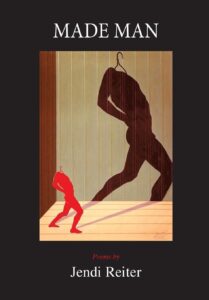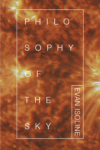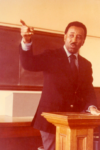
[Little Red Tree Publishing; 2022]
Jendi Reiter’s newest poetry book is a compelling look at gender diversity and the events that accompany transitioning. However, the book is not solely a trans narrative. Throughout Reiter’s gender journey, they consider an array of topics including fine art, faith, and butternut squash. Indeed, part of what makes the collection unique is the fact that the theme of transitioning is at the center, yet so many other eclectic subjects spin around that center — a reminder that our lives are always about more than any one thing, no matter how urgent it is.
In fact, a refreshing playfulness permeates the book, beginning with the very first poem, “Self-Portrait as Pastry Box”:
Remember him who was lifted
from the river, from the box he was sealed in.
The snapped wafer laid on your tongue like a secret
Recipe . . .
. . .
Take the cannoli, broken for you.
This kind of irreverent humor is echoed in poems with creative titles like “It’s Not Sensory Processing Disorder, You’re a Werewolf,” “Trans Formers,” “Lesbian Dinosaur Island,” and “My Longest Female Relationship is with my Subaru,” to name just a few. One such poem, “Tired of My Own Vagina,” takes a delightfully magical realist approach to the body:
I’ve been quarantined in my vagina for six months and I’ve
washed every window. Birds thump into the glass of my vagina
like confused peaches . . . I’m thinking of building a sunroom onto
my vagina if I can find a carpenter who’ll wear a bag over his
face.
The wryness of these lines beautifully belies the pain and frustration of dysphoria. And it is this tension between gender euphoria and dysphoria that is one of Made Man’s characteristic features.
For example, “Dreaming of Top Surgery at the Vince Lombardi Rest Stop” places the trans speaker amidst “the great men of New Jersey /Turnpike bathrooms,” one of many examples of the wickedly playful lineation Reiter employs. Here, Walt Whitman “unbuckles /his big-‘n’-tall Levis at his eponymous urinal” and Joyce Kilmer “shall never see a poem lovely /as pulling off at this oasis /in the bumper-to-bumper wasteland, /sweet relief only a locked door away.” The speaker themself “tr[ies] to sneak into the Men’s Room /behind my hopping little boy and patient husband,” and is suddenly plagued with doubt about their ability to “pass”:
no one will honor
my Provincetown tank top, shaved scalp and untrimmed chin hair
as more than the forgivable marks
of a 12-hour roadtrip mom who’s quit trying.
A cheekier example of this tension can be found in “Strap-On Ghazal,” which ends:
I, Jendi, though my leg hair grows like fruited plains,
Must make do with ordered-from-Amazon penis.
Though the poems on transgender themes are central to the book, the poems that do not deal explicitly with this theme are also suffused with a sense of transformation. Animals take on human characteristics: “Rattlesnake reviews /candidates for lunch; /. . . /Secretary Bird prefers /to run. Her height’s all legs /like Barbie.” Mundane objects are alchemized into the sublime: “Butternut squash, you are the War and Peace of vegetables. /So heavy, traditional, symbolic of grand ambitions unfulfilled.” These transfigurations remind us of the human tendency to explore possibilities: to see faces in car grilles, shapes in clouds, the future in tea leaves. As much as people claim to loathe change, it is also understood to be an elemental part of existence. The need to change one’s body, then, can be read as another manifestation of this universal impulse. Therefore, Made Man becomes an examination and celebration of change writ broadly along with all its magickal implications.
In addition to their variedness in content, Reiter’s poems are diverse in form. There are some brilliant list poems like “Great Tits of the World” and “The Ten Most Manly Things The Ten Most Feminine Things.” There are poems which engage with outside texts in experimental ways like “Signifiers for a Male Response,” which riffs on Hal Fischer’s classic text Gay Semiotics. There is a found poem “composed of filler phrases from spam emails” entitled “Favors for Undesirable Men,” which uses the word salad of algorithms to simultaneously obfuscate and reveal desire:
Horton: lounge bartend asexual chronic
admire the creamcolored beautiful secretary
lettuce masturbate
one sexy cylinder — visible, lengthy!
Similarly, in “Racist Uncle Tired of Being Blamed for Abolishing Thanksgiving,” which was co-authored by a bot, semi-randomized language is assembled into something coherent yet fraying at the edges:
You expect me to
keep track of all the names these kids give themselves, like
they’re, I don’t know, Lake Pottawatomie or something? I don’t
know what those people are complaining about, we named our
footballs after them. My parents worked hard for every nickel
they pulled out of my ear. Nobody wrote the toilet signs for
them in a foreign language and gave them a special history
book saying they were the Queen of Egypt.
These poems invite the question — is Made Man’s goal, at least in part, to simultaneously muddy and clarify gender? Desire seems simple — person A wants person B — yet it is full of contradictions and taboos. Racist uncles are clearcut assholes, yet their worldviews are rooted in a version of reality they have absorbed from outside sources, including Russian bots. Gender, as Reiter and many others suggest, is both a social construction and an intimate part of the self. It can appear to be reducible to labels like trans man and genderqueer, yet those labels carry different meanings from person to person. By highlighting ambiguity and algorithms in some of their poems, Reiter finds another, less direct way to address the messiness of gender and compares it to the messiness of so many other parts of our lives.
In doing so, they remind us that there are
So many ways a boy can be made
to fly through the air.
It’s nothing remarkable, really.
The part you have to believe
is that he never comes down.
Michael McKeown Bondhus (formerly Charlie), a bigender (male/neutrois) Irish-American writer, is the author of Divining Bones (Sundress, 2018) and All the Heat We Could Carry (Main Street Rag, 2013), winner of the Thom Gunn Award for Gay Poetry. His work has appeared in Poetry, Poetry Ireland Review, The Missouri Review, Columbia Journal, and others. He has received fellowships from the Virginia Center for Creative Arts, the Sundress Academy for the Arts, and the Hawthornden Castle International Retreat for Writers (UK).
This post may contain affiliate links.







